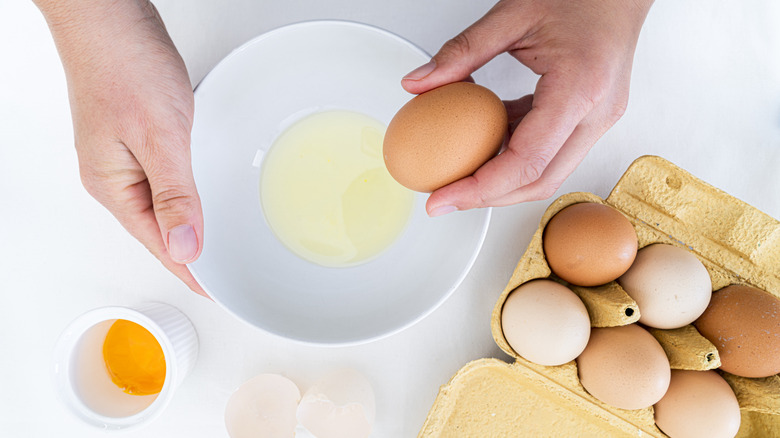Will Frozen Eggs Go Back To Normal Once Thawed?
While it's never advisable to freeze eggs in their shells, this does occur from time to time. If your fridge is set to a low temperature and is colder on one shelf than another, eggs that are still in their shells can easily freeze, and you don't even realize it until you go to bake those sugar cookies for a Christmas party or make double chocolate chip blueberry pancakes for Sunday breakfast.
While it isn't uncommon, the real question is: What do you do when it happens? Will they go back to normal? The answer is ... not really, but that doesn't mean you should toss them. They can still be used, just with limitations.
First, if your eggs freeze in their shells and don't crack, you want to leave them frozen until you're ready to thaw and use them. (If the shells cracked when the eggs froze, you need to toss them.) When you are ready to cook something up, it's best to use your frozen eggs for baked goods and to make dishes that require hard-boiled eggs, because as the frozen eggs thaw, their yolk gains a thick, viscous consistency. This, unfortunately, makes the yolk difficult to whip up and blend with the egg white. But they are great for a classic egg salad!
How to thaw your frozen eggs
While egg yolks don't work very well in recipes after being frozen, you can easily freeze and use leftover egg whites. So, if you have frozen eggs, you can discard the yolks and make homemade French meringue or an egg white omelet.
Thaw the frozen eggs and separate the yolk from the white as you would normally do. It is important to note that once the egg is thawed, it needs to be used pretty immediately. That said, you may want to let the egg whites set out on the countertop so they can warm to room temperature. This temperature change will make it possible for you to whip them up more effectively and get the full volume you're hoping for.
To thaw your frozen eggs, place them with the shell still intact in a bowl, then put them in the refrigerator and allow the egg to thaw overnight. If you need them quicker, you can place the frozen eggs in a sealable, airtight bag and immerse them in a bowl of cold water for about 15 minutes. You'll be able to tell your eggs have properly thawed if the egg white is loose and falls into the bowl when you crack it open. Because the yolk is denser, it may take a little longer for it to thaw.

